|
|
|
Sort Order |
|
|
|
Items / Page
|
|
|
|
|
|
|
| Srl | Item |
| 1 |
ID:
191271
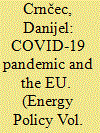

|
|
|
|
|
| Summary/Abstract |
The article examines the implications held by the EU's response to the COVID-19 pandemic for the green transition as set by the European Green Deal. It distinguishes changes in: (a) the use of policy instruments; (b) governance principles; and (c) the prioritising of policy goals as expressed via the conceptual framework of orders of change. The article assesses the extent of these changes as well as the patterns and regional variations among EU Member States, together with the Commission's role in pushing for preferential energy policy choices and encouraging the Member States' ambitions. The analysis shows the EU Energy Union governance framework was promoting the EU's climate targets' full integration into the EU's energy transition policy instruments (first order of change) even before the European Green Deal. Still, the EU's response to the COVID-19 crisis created strong financial and policy leverage to accelerate the green transition and gave an opportunity to close the gap between less ambitious and more ambitious EU countries. Many countries traditionally reliant on EU funds seized this opportunity, demonstrating the role of changed governance principles (the second order of change). However, the crisis has had an evolutionary impact, not a revolutionary one. While coherence between the energy and climate goals remains high, the EU's energy transition is falling short in fully integrating biodiversity (which would constitute a full paradigmatic, third-order change), despite this being an essential component of the EU's green transition.
|
|
|
|
|
|
|
|
|
|
|
|
|
|
|
|
| 2 |
ID:
128448
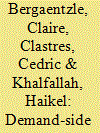

|
|
|
|
|
| Publication |
2014.
|
| Summary/Abstract |
Demand side management (DSM) in electricity markets could improve energy efficiency and achieve environmental targets through controlled consumption. For the past 10 years or so DSM programmes have registered significant results. However, detailed analysis of its real impact as observed by a large number of pilot studies suggests that such programmes need to be fine-tuned to suit clearly identified conditions. This study aims to provide recommendations for the instruments to be used to prompt demand response with a view to maximizing energy and environmental efficiencies of various countries. The present study suggests that different DSM models should be deployed depending on the specific generation mix in any given country. Beside the natural benefits from cross-borders infrastructures, DSM improves the flexibility and reliability of the energy system, absorbing some shock on generation mix. We show efficiency increases with demand response but at a decreasing rate. So, according to rebound and report effects, simple DSM tools could be preferred.
|
|
|
|
|
|
|
|
|
|
|
|
|
|
|
|
| 3 |
ID:
191231


|
|
|
|
|
| Summary/Abstract |
Civil society plays an important role in European energy and climate policymaking. This paper poses the questions of how organized civil society handled the opportunities and challenges presented by the lockdown to its access to the climate and energy policymaking within the European Commission (EC)? How has the balance between organized civil society groups and businesses in Europe been affected by pandemic-related travel restrictions? Moreover, what role has the EC played in creating such opportunities and affecting the legitimacy of democratic policymaking? This research sheds light on the changing role of the EC in democratic governance and policy formation in the European Union (EU) by examining the relationship between funding received by CSOs active in the policy areas of environment and climate, the number of meetings attended, and the importance of coalitions and networks. This research revealed a possible relationship between level of participation in policymaking and the operational support received from the EC. Despite the resources invested, opportunities for interest representation in the energy and climate policy areas disproportionately favor businesses and organizations with long-term relationships with and proximity to Brussels. Increased number of virtual meetings only marginally increased share of participation of NGOs in these meetings. Thus, a physical presence in Brussels and resource investment remain important factors in access to the EU policymaking.
|
|
|
|
|
|
|
|
|
|
|
|
|
|
|
|
| 4 |
ID:
169736


|
|
|
|
|
| Summary/Abstract |
We extend and use the PRIMES energy model to explore pathways towards climate-neutrality in the EU by 2050 and 2070 and analyse implications on energy demand, supply and costs. We draw on the modelling, data and scenario framework developed by the authors to support the European Commission's “Clean Planet for All” communication, released in November 2018. Based on model results for numerous scenarios and sensitivity runs, we analyse key issues to explore feasibility, uncertainties, costs and priorities for climate-neutrality strategy. We suggest that a sustainable climate-neutral energy system in the EU is feasible using known technologies. We emphasise that the EU's climate and energy package for 2030 currently in legislation is not sufficient to ensure climate neutrality by 2050. We characterise as of “no-regret” options promoting energy efficiency, renewables and electrification where cost-effective. However, carbon neutrality also necessitates alternative options of “disruptive” nature. Technologies supporting the disruptive options are not yet mature in industry. High uncertainty surrounds their learning potential. Their deployment heavily depends on policies facilitating investment. The system analysis based on the model illustrates the importance of sectoral integration. We argue that hydrogen, and to a certain extent synthetic carbon-neutral hydrocarbons, are critical elements among the disruptive options.
|
|
|
|
|
|
|
|
|
|
|
|
|
|
|
|
| 5 |
ID:
153503
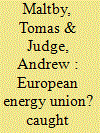

|
|
|
|
|
| Summary/Abstract |
Fears about the security of supplies have been central to debates about the development of an integrated EU energy policy over the past decade, leading to claims that energy has been ‘securitised’. Previous analyses have found, however, that although shared security concerns are frequently used as justification for further integration, they can also serve as a rationale for Member States to resist sharing sovereignty. Transcending this apparent paradox would require not just agreement about whether energy supplies are security concerns, but also agreement about what kind of security concern they are. In this article, we examine whether such an agreement could emerge through a comparative analysis of constructions of gas security in the UK and Poland. Utilising a framework that draws from both the philosophical and sociological wings of Securitisation Studies, we demonstrate that although gas has been elevated on the security agendas of both states, the specific logic of insecurity – securitisation or riskification – underpinning these constructions differs substantially, and is conditioned by distinct modes of governance in each Member State. This, we contend, limits the potential for further integration of EU energy policies in the context of the European Commission’s proposals for an ‘Energy Union’.
|
|
|
|
|
|
|
|
|
|
|
|
|
|
|
|
| 6 |
ID:
192713
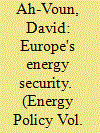

|
|
|
|
|
| Summary/Abstract |
This paper examines the impact of EU energy policies, namely the National Energy and Climate Plans (NECP19) and REPowerEU (2022), on the European natural gas security of supply. Our analysis shows that the REPowerEU plan significantly cuts gas demand by 133 bcm compared to NECP19. This shift can make Europe independent from Russian gas by 2030. Executing REPowerEU requires faster, clean technology deployment. The EU needs to catch up in installations to reach REPowerEU targets, while NECP19 maintains high gas demand (423 bcm till 2030), potentially exacerbating gas import dependence. NECP19 not only raises gas demand but also brings substantial inter-annual variation (IAV) of demand. In cold years (twice in ten years), demand spikes by 39 bcm, and warm years (three in ten years) decrease it by 23 bcm. REPowerEU, while moderately increasing gas demand variation (around 7% versus NECP19), does not solve the demand variability issue. In extremely cold years (one in forty years), Europe may face a 46 bcm gap, around a quarter of the spot LNG market. Failing REPowerEU not only heightens gas import risk but also risks price spikes under varying climates and global market conditions. We offer policy recommendations to address potential price spikes related to IAV demand.
|
|
|
|
|
|
|
|
|
|
|
|
|
|
|
|
| 7 |
ID:
176703
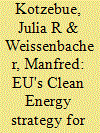

|
|
|
|
|
| Summary/Abstract |
The European Union has more than 2200 inhabited islands. Many keep relying on fossil fuel-based energy systems, even though they are endowed with renewable energy resources (RES) and have access to gradually improving renewable energy technologies. In May 2017 the EU Commission and 14 member states with island territories signed the so-called “Valletta Declaration” in Malta's capital. The declaration states that islands can be favorable for innovative solutions and investments in local renewable energy production, given the abundance of various RES. However, the island nation of Malta features very low renewable energy shares within the EU. The Energy transition theory in the field of sustainable transition studies explains social and technological system-wide evolution and innovation, but only few scholars have focused on spatial governance in islands’ energy transition. Malta's urbanization rate is about 95%, which creates a spatially extreme situation. The policy perspective clarifies the role of spatial governance in Malta's energy transition from a fossil fuel-based to a non-fossil fuel-based country. A theoretical spatial governance framework guides the analysis. The perspective highlights that Malta's centralized and hierarchical spatial governance structure creates an environment, in which the spatial situation is used to argue against small and de-centralized renewable technologies.
|
|
|
|
|
|
|
|
|
|
|
|
|
|
|
|
| 8 |
ID:
153344


|
|
|
|
|
| Summary/Abstract |
Focusing on natural gas and pipeline infrastructures, and adopting the concept of “forms of state”, the article examines the transformation of energy security politics in Europe. Three state models, with their related pattern of energy diplomacy, are sketched: the partner state, which describes the original politics of the European gas market; and the provider state and catalytic state, which describe two alternative possibilities of the emerging politics in the new institutional and ideational context promoted with the establishment of the internal energy market and the development of the EU’s external energy policy. By analysing the politics of pipeline in Southeastern Europe, the article argues that the catalytic state model with its related pattern of network energy diplomacy is more appropriate than the provider state model, supported by the market approach and its related pattern of multilateral diplomacy, to conceptualise the equilibrium emerging from the transformation of the previous system.
|
|
|
|
|
|
|
|
|
|
|
|
|
|
|
|
| 9 |
ID:
088893
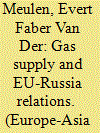

|
|
|
|
|
| Publication |
2009.
|
| Summary/Abstract |
Drawing on New Institutional Economics (NIE) theory, the article argues that EU energy policy towards Russia damages security of supply because it neglects the specific aims and propensities of Russia and Gazprom. EU Commission initiatives are based on the promotion of interdependence through market opening, favouring a policy of competition over security of supply. The reason for this focus is found in the EU's embedded inclination towards liberal markets. Russia, by contrast, has chosen suboptimal state control of natural resources over the frontier capitalism of the 1990s. Sustainability of the current rent based system and geopolitical considerations are essential to Russia and Gazprom. In this situation a pragmatic approach that aims at security of supply and security of demand seems to be more successful. In this approach, liberalisation of the market can only be a long-term goal.
|
|
|
|
|
|
|
|
|
|
|
|
|
|
|
|
| 10 |
ID:
166337
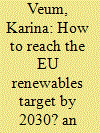

|
|
|
|
|
| Summary/Abstract |
In the absence of post-2020 national binding renewable energy (RES) targets, ensuring Member States’ contributions which add up to the EU-level target by 2030 poses a challenge to the EU governance framework. Even without national targets, Member States remain key players to reach a 2030 RES target.
|
|
|
|
|
|
|
|
|
|
|
|
|
|
|
|
| 11 |
ID:
115636
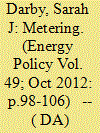

|
|
|
|
|
| Publication |
2012.
|
| Summary/Abstract |
Fuel poverty is a function of household energy consumption, income, and the cost of delivered energy. The paper discusses ways in which current EU policy on the development of 'smart' metering could affect fuel poor households. The main focus is on developments in electricity metering and the development of 'active demand' and smart grids, so that demand can be matched closely with available supply. Advances in metering and related technologies open the way to time-of-use charging, easier switching between suppliers and between credit payment and prepayment, direct load control of some end-uses by the utility, greater scope for microgeneration, and improved consumption feedback for customers. These options open up both uncertainties and risks.
The paper offers definitions and discussion of various functions of smart metering, summarizes the EU policy background, and considers some possible equity implications of rolling out a new generation of meters. There follows an assessment of potential implications to the fuel poor of changes to metering, based on a review of the literature on energy feedback, tariffing, and supplier-customer relationships. Much of the discussion is based on the UK experience, with examples from other EU member states and, where appropriate, from other parts of the world.
|
|
|
|
|
|
|
|
|
|
|
|
|
|
|
|
| 12 |
ID:
099321
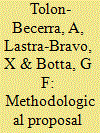

|
|
|
|
|
| Publication |
2010.
|
| Summary/Abstract |
A 20% reduction in the consumption of energy is one of the main goals of the European Union's (EU) 20/20/20 Energy Strategy. But the uniform application of this overall goal to all of the countries is neither fair nor equitable, as it does not take into consideration the characteristics of the energy system in each Member State. This article therefore proposes a nonlinear distribution methodology with objective, dynamic goals for reducing gross inland energy consumption, according to the context and characteristics of each member state. We hope it will open discussion on how these overall goals can be weighted. Then we analyse the situation of the energy indicators related to energy efficiency in the reference year (2005) used by the EU for reaching its goal of reducing the gross inland consumption by 20% by 2020, and its progress from 1996 to 2007. Finally, the methodology proposed is applied to the year 2020 on the NUTS0 territorial level, that is, to members of the EU, according to the EUROSTAT Nomenclature of Territorial Units for Statistics (NUTS). Weighting is done based on energy intensity, per capita gross inland consumption and per capita energy intensity in two scenarios, the EU-15 and EU-27.
|
|
|
|
|
|
|
|
|
|
|
|
|
|
|
|
| 13 |
ID:
125596
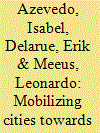

|
|
|
|
|
| Publication |
2013.
|
| Summary/Abstract |
In the transition towards a low-carbon future in Europe, cities' actions are of major importance due to the prominence of urbanization, both in terms of population and in terms of greenhouse gas (GHG) emissions. As a result, we need city authorities to act, by using their competences as policy makers as well as energy users. However, cities are still not moving as fast as one might expect, indicating the need for additional incentives to prompt local action. Therefore, the aim of this paper is to present an overview of external incentives that might prompt cities to act and to highlight good practices that could be used in future initiatives.
This paper first discusses how to evaluate the climate and energy performance of a city and how local authorities can contribute to its improvements. Moreover, it analyses the disincentives that local governments are confronted with, categorizing them as simple market failures, institutional failures and multi-agent failures. The paper then presents a survey of initiatives at national and EU levels to promote local action towards a low-carbon future; grouping them into tambourines, carrots and sticks. We focus on Austria, Germany, the Netherlands and Sweden because they are pioneering countries regarding energy policies for cities.
|
|
|
|
|
|
|
|
|
|
|
|
|
|
|
|
| 14 |
ID:
162896
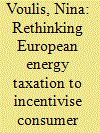

|
|
|
|
|
| Summary/Abstract |
The European Union considers demand response to be an integral part of its future energy vision, in particular as a supporting mechanism for renewable resource integration. To achieve high demand response participation, the European Union recognises the need for adequate financial incentives for all consumers, especially for residential and service sector consumers. However, the European Energy Tax Directive, which regulates energy taxation in the European Union, is currently not in alignment with this vision, as it does not provide any financial incentives for demand response participation. This paper explores the potential of energy taxes to provide such incentives. First, through an analysis of the current energy taxation and demand response literature. Second, by quantifying the difference in financial incentives between two tax designs (per-unit and ad valorem taxes) in a simulation case study of consumers heat pumps in the Netherlands. Results show that financial incentives are 3.5 times higher for the ad valorem tax than for the per-unit tax. The paper concludes with recommendations for policy makers for the design of energy taxes that provide residential and service sector consumers with adequate financial incentives for demand response participation.
|
|
|
|
|
|
|
|
|
|
|
|
|
|
|
|
| 15 |
ID:
137313
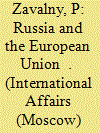

|
|
|
|
|
| Summary/Abstract |
International Affairs: Pavel Nikolayevich, your report opened the 9th Annual International Conference "Russia-EU Energy Dialogue: Gas Aspect. " How did the worsening of relations between Russia and Europe over the situation in Ukraine affect the conference?
P. Zavalny: The "Russia-EU Energy Dialogue: Gas Aspect" conference is a joint event held for many years by the Russian Gas Society and the European gas industry association Eurogas with the participation of the European Commission's Directorate-General for Energy. At first, the conference met in Berlin, but in the past three years it has met in Brussels, the decision-making center in the area of EU energy policy. As a rule, all our conferences were rich in content, with concrete and sometimes heated debates, and were always attended by high-ranking officials from both sides, parliamentarians, top managers of major energy companies, experts, and researchers.
|
|
|
|
|
|
|
|
|
|
|
|
|
|
|
|
|
|
|
|
|